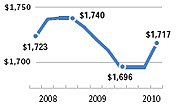The region’s rental market has tightened in recent months, with apartment vacancies falling and rents rising for the first time since the beginning of the economic crisis. Analysts said the changes, while small, signal a market shift that is making apartments harder to find and afford when many families are struggling with lost jobs, lost homes, and pay cuts.
A year ago, landlords were chasing renters with price cuts and enticements to combat high vacancy rates. Now, tenants are competing for fewer available units, as surging foreclosures force more people into the rental market. Meanwhile, tight credit and an uncertain housing market keep many renters from leaving apartments to become homeowners.
The result: Vacancy rates fell to 6.2 percent in Greater Boston in the second quarter of the year, the lowest level in 18 months, while average asking rents increased for the first time since 2008, rising 1.2 percent to $1,717 a month, according to Reis Inc., which tracks occupancy in buildings with 40 units or more.
“A 6 percent vacancy rate is what you’d expect in a fairly strong economy and that we have that in a weak economy is something quite extraordinary,’’ said Barry Bluestone, dean of the School of Public Policy and Urban Affairs at Northeastern University. “I worry about these things because all the analysis shows that we continue to see less and less affordability, relative to income.’’
The rental squeeze is being felt from triple-deckers in working-class neighborhoods to luxury buildings in downtown Boston, according to brokers and analysts.
Reginald Fuller is among the renters discovering that apartments are harder to find — and afford.
Forced to seek a new place after his pay was cut in half and his rent increased by $150 a month, Fuller has searched for three months to find a new apartment for his family. Now, just weeks from eviction, Fuller worries that he, his wife, Louanna Hall, his 10-year-old nephew, and his 67-year-old father-in-law will end up in a shelter.
“It makes me kind of feel like I let my family down,’’ said Fuller, 53. “I’m about to join the ranks of the homeless, and that’s a place I’ve never been.’’
Foreclosures, on track to break record levels, are a key contributor. Lenders seized 1,300 Massachusetts homes in June, twice as many as a year earlier, according to the Warren Group, a Boston company that tracks local real estate. Completed foreclosures totaled 7,431 in the first half of 2010, up 57 percent from the same period last year.
In Boston, foreclosures have reduced the supply of apartments as banks, unwilling to be landlords, evict tenants and shutter buildings.
The city does not track how many bank-owned properties are vacant, but of 49 bank-owned two- and three-family homes bought by the city since 2008, 40 were vacant at the sale, said Evelyn Friedman, director of Boston’s Department of Neighborhood Development.
Bank-owned properties often remain vacant until the property is sold or rented again, reducing the available housing stock.
The rising number of bank-owned properties has probably contributed to a 27 percent jump in Boston rents in the second quarter, said Friedman, who calculated the price increase based on newspaper listings. “It’s a big problem,’’ she said.
Fuller and his family had lived at their Bullard Street apartment for two years when the owner lost the building to foreclosure. A new owner bought the building from the bank and raised the rent just as Fuller, a security guard, saw his pay fall to $24,000 from $50,000 a year after overtime shifts were eliminated.
As he desperately searches for an apartment, many triple-deckers and two-family homes seized by banks in Dorchester’s Geneva Avenue neighborhood stand boarded up or simply vacant.
“There’s not buyers for every building,’’ said Zoe Cronin, a lawyer at Greater Boston Legal Services who works with owners and renters with foreclosure problems. “It’s really terrible, we have people entering the shelter system and buildings sitting unused. It makes me sick.’’
Meanwhile, brokers who rent in the mid-level and high-end markets said many large buildings are close to full, and owners no longer have to offer incentives, from gift cards to free rent, to entice people to move in.
Edward E. Zuker, the president of Chestnut Hill Realty, which owns and manages 4,000 apartments in Massachusetts and Rhode Island, said 2009 was one of the slowest years for rentals, but this year he has rented a record number of units. The occupancy rate is 98.5 percent, he said, “which we’ve never seen before in 40 years.’’
In Charlestown, Harborview, a 215-unit complex, is “north of 95 percent occupancy,’’ said Kevin Ahearn, the president of Otis & Ahearn Real Estate in Boston. Complexes such as Fenway Triangle Trilogy on Brookline Avenue, Charles River Park near Beacon Hill, and Archstone Avenir on Canal Street near the Rose Fitzgerald Kennedy Greenway are also largely full, he said.
Ahearn speculated that more empty nesters — couples whose grown children have left home — have been moving to the city after selling suburban houses and renting before they buy again.
At the same time, said Nick Retsinas, director of Harvard’s Joint Center for Housing Studies, many renters who in years past might have moved into homeownership are delaying that because they think prices could fall. Other would-be buyers simply can’t get a mortgage because of tighter credit.
Stan Corston, who recently moved to Brookline from Moscow, said he and his wife planned to stay in a hotel for a few days to look for an apartment. Three weeks and many appointments with realtors later, he found an apartment after boosting his rent budget to $2,500 a month from $1,500. He agreed to take an apartment under construction at Longwood Towers in Brookline.
“I was picky at first,’’ Corston said. “But by the third week we would have moved in any place that would let us.’’
Megan Woolhouse Boston Globe August 10, 2010

No comments:
Post a Comment